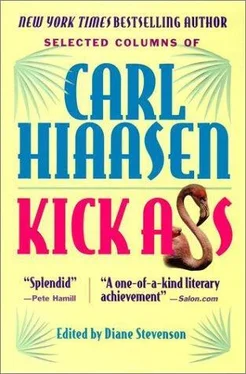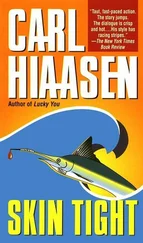It's a swell deal for Huizenga. But as long as elected lawmakers do what billionaires tell them, billionaires will continue to ask for outrageous favors.
Ordinary folks needn't bother. Nobody who runs a mom-and-pop diner could con the state into buying them a new Mr. Coffee, much less a wall-to-wall renovation. Nor would they dream of trying.
Then again, ordinary folks can't afford to shower politicians with the hefty campaign donations that Huizenga spreads around. That's how votes are bought, and that's how these boondoggles are orchestrated.
If Stadium Giveaway II sails through the Legislature as expected, as much as $120 million in public funds will have been earmarked for improvements to JRS. That particular crater in the state's tax booty will be filled with other money—yours, mine, the folks with the diner.
To help groveling lawmakers defend their obeisance, Huizenga's forces have provided a sheath of hilariously inflated statistics about how much the Dolphins' eight regular-season home games contribute to South Florida's economy.
Think about that when you visit one of Wayne's new toilets.
You could flush yourself silly, but you'll never catch up to them boys in the Capitol.
Speedway lessees race to the bank
April 13, 1997
When Ralph Sanchez and Wayne Huizenga joined forces at the Homestead motor speedway, you knew good things would happen.
To Ralph and Wayne, of course. Not necessarily to Homestead.
Sure enough, Sanchez and Huizenga are about to roar away from the troubled racetrack with at least $10 million each, while the flat-broke city limply waves a checkered flag.
Sanchez claims the place can't make it without hosting the popular Winston Cup stock car races—something that won't occur unless he and Huizenga sell out to NASCAR impresario Bill France.
France didn't want the track unless the lease was watered down. Last week the city obliged.
"I walked out of the council chambers sick to my stomach. They gave away the farm," says Steve Losner, a lawyer whose family has been in Homestead for 70 years.
It was as predictable as it is pathetic. The 65,000-seat motorsports complex was built with public funds, including $31 million from county tourist taxes and bond sales. How much will Dade get from the Sanchez sellout? Zippo.
Homestead itself has spent $8 million on the track, and is in debt for another $25 million. Its take from the new deal: nada. Amazing, considering that the city is deeply in the red, and that workers are being laid off.
Meanwhile, Wayne and Ralph can peel rubber on their way to the bank. It was a match made in heaven, two masters of finagling public funds for private projects.
By selling his share of the Homestead lease, Sanchez would maintain a perfect record: In 15 years he's never operated a racetrack that made money. Oh, he made plenty—but not the races, and not the municipalities that subsidized them.
After skipping out of downtown Miami, Sanchez found fresh suckers in hurricane-battered Homestead. True to form, he miscalculated the cost of the new speedway by about 500 percent, and his lofty promise of reviving South Dade's economy turned out to be hot air.
Even the track itself has been a headache, beset with costly design flaws that cast large doubts upon Sanchez's touted racing expertise. Huizenga came in as a partner by loaning $20 million for new construction.
Now Sanchez says the racetrack is "overbuilt." Seriously, that's what he says. He told New Times: "If I didn't have to sell I wouldn't sell, but this is the reality of the situation."
Here's the reality: He and Huizenga are making out like bandits, while taxpayers are once again eating dust.
Of all Sanchez's failures, Homestead will be his most lucrative. In a meeting with South Dade business leaders on April 3, he admitted that he and Huizenga each will receive about $ 10 million if France buys them out.
Which seems likely, since the track's new tenant is no longer required to share race profits with the city—one of several outlandish concessions approved by council members.
The hosing was orchestrated by none other than Alex Muxo, who did plenty of damage as Homestead's city manager. Now conveniently employed by Huizenga, Muxo met individually with council members at the racetrack.
His message: This thing won't ever fly without a Winston Cup weekend.
In other words, forget the Indy cars. Forget the Jiffy Lube. Forget everything Sanchez promised four years ago.
Many folks in Homestead won't forget. Neither will some of the politicians who gave him that first $31 million. As former Metro Commissioner Maurice Ferre lamented: "I still wonder how we could have allowed this to happen."
Join the club.
If three's a crowd, what is 5 million?
September 13, 1985
Something dismal to contemplate next time you're stuck in highway traffic:
This week the National Planning Association predicted that Florida will have 5.7 million more residents by the year 2000 than it had in 1980.The Census Bureau forecasts 7.7 million, though this is considered high. And the University of Florida's Bureau of Economic and Business Research conservatively puts the growth at 5 million.
Which is still equivalent to absorbing the entire population of Missouri. Or, put another way, if the number of new people invading Florida during the next 15 years formed their own state, it would be more populous than 38 other states.
Incredibly, there are those walking among us who think this is wonderful news, and who are busily restructuring their banks, mapping new condominium clusters and dreaming up bigger and better trailer parks.
Meanwhile, growing numbers of dispirited Floridians wonder where it will all end, and worry about already-frayed quality of life.
"You're talking about a 50 percent increase in a 20-year period. In terms of numbers of bodies, it's a tremendous increase," says Stanley K. Smith of the University of Florida.
Among the fastest growing counties are Palm Beach, Lee, Collier, St. Lucie and Martin. Broward is still growing, though not nearly as fast as before, while Dade County is stagnant, its new arrivals nearly matched by those packing up and heading north.
As expected, most newcomers hail from places that are either cold, crowded, dirty or economically depressed. By the turn of the century, they will have enlarged our numbers to 14.7 million.
As John D. MacDonald has observed, almost everyone who moves down here wants to slam the door behind him. This might be selfish, but it's also understandable: It doesn't take a disciple of Thoreau to notice the loveliness of Florida wane in direct proportion to humanity.
"At some point," Smith says, "it's possible that the quality of life will become so unattractive that no one will want to move here. That'll solve your growth problems. But that's like cutting off your arm to save the whole body."
This year the Legislature passed a "growth management" law, supposedly to impose order on the state's tumultuous development.
Frankly, the notion of "orderly growth" is about as tangible as the tooth fairy. Growth that is orderly would break a century-old tradition of lust, greed and wantonness. Already three Florida counties (Palm Beach, Broward and Dade) hold more human beings (3.5 million) than the states of Mississippi or Colorado or Oregon or Oklahoma, to name a few.
No governor in our history has voiced as much concern for the trampling of Florida as Bob Graham, but I doubt that even he has the clout to put on the brakes. He is considered bold for endorsing "growth management," but he'd be laughed off his lectern for suggesting a growth cap.
So we're stuck with this stampede.
Читать дальше









